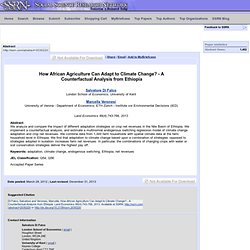

The Corruption Pandemic - By Christian Caryl. Laurence Cockcroft is worried about global warming.
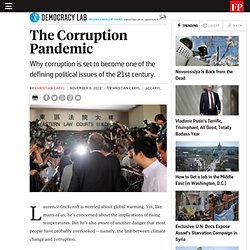
Yes, like many of us, he's concerned about the implications of rising temperatures. But he's also aware of another danger that most people have probably overlooked -- namely, the link between climate change and corruption. So what could these two things possibly have to do with each other? A lot, it turns out. Cities of the Future: Made in China - By Dustin Roasa. For much of the 20th century, the world looked to American cities for a glimpse of the future.

Places like New York and Chicago had the tallest skyscrapers, the newest airports, the fastest highways, and the best electricity grids. But now, just 12 years into the Asian Century, the city of the future has picked up and moved to China. No less than U.S. Vice President Joe Biden recognized this when he said not long ago, "If I blindfolded Americans and took them into some of the airports or ports in China and then took them to one in any one of your cities, in the middle of the night … and then said, 'Which one is an American? Which one is in your city in America? In these cities, visitors arrive at glittering, architecturally arresting airports before being whisked by electric taxis into city centers populated by modular green skyscrapers. The Migrant Money Machine - Peter Passell.
Everybody knows that the tens of millions of migrants from developing countries (documented and undocumented) who work in Europe, North America and the Persian Gulf send home a lot of money.
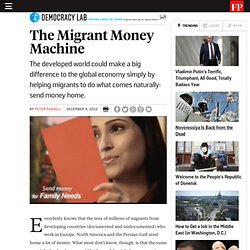
What most don't know, though, is that the sums are triple the development aid budgets of the rich donor countries, and growing rapidly. Nor are many people aware that remittances have morphed from an afterthought to a key component in strategies for transforming poor countries into successful "emerging market" economies. Indeed, it's becoming clear that Lant Pritchett, a brand-name economist now at the Center for Global Development, was ahead of his time in arguing that the best thing rich countries could do for the developing world is to let their migrants do the heavy lifting.
Start with the numbers. Remittances to developing countries, which were below $100 billion as recently as 2002, reached $372 billion in 2011. The People's Republic of California - By Michael Levi. At the annual U.N. climate talks in Doha, Qatar, delegates are undoubtedly applauding the new Australian cap-and-trade scheme, bemoaning Canada's withdrawal from the Kyoto Protocol, and wondering what to do about emissions from emerging India.

They will spend far less time thinking about an economy bigger than any of those: California. California's new cap-and-trade system is perhaps the biggest good news climate story this year, and delegates in Doha should be celebrating it. Just last month, environmentalists celebrated California's first successful auction of carbon emissions allowances. Yet the rise of Sacramento and other state capitals as leading forces in U.S. climate policy raises thorny foreign-policy dilemmas, too. These are easy to miss because U.S. states have no seats at the global climate talks, but are nevertheless critical for negotiators around the world to address.
Big cat crisis: Africa's lions being crowded out by people. The lions that roam Africa's savannah have lost as much as 75% of their habitat in the last 50 years, a study has found.
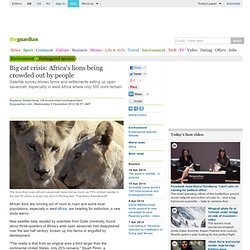
Photograph: Thanassis Stavrakis/AP African lions are running out of room to roam and some local populations, especially in west Africa, are heading for extinction, a new study warns. Hostile states using cyberwarfare to attack UK infrastructure. Hostile foreign states have used cyberwarfare to attack and map the networks that are part of the country's critical national infrastructure, the government has admitted.

China and Russia Block Proposal to Protect Antarctic Waters. 05 Nov 2012: China and Russia Block Proposal to Protect Antarctic Waters International talks to protect large areas of the Southern Ocean surrounding Antarctica collapsed last week after several nations, including China, blocked the proposal over concerns about fishing access, according to reports.
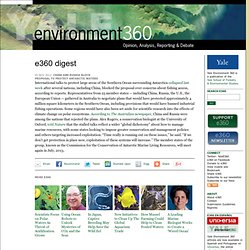
Representatives from 25 member states — including China, Russia, the U.S., the European Union — gathered in Australia to negotiate plans that would have protected approximately 4 million square kilometers in the Southern Ocean, including provisions that would have banned industrial fishing operations. Some regions would have also been set aside for scientific research into the effects of climate change on polar ecosystems. According to The Australian newspaper, China and Russia were among the nations that rejected the plans. Yale Environment 360 is a publication of theYale School of Forestry & Environmental Studies. About e360ContactSubmission GuidelinesReprints.
How African Agriculture Can Adapt to Climate Change? - A Counterfactual Analysis from Ethiopia by Salvatore Di Falco, Marcella Veronesi. Salvatore Di Falco London School of Economics; University of Kent Marcella Veronesi University of Verona - Department of Economics; ETH Zürich - Institute vor Environmental Decisions (IED) Land Economics 89(4):743-766, 2013 Abstract: We analyze and compare the impact of different adaptation strategies on crop net revenues in the Nile Basin of Ethiopia.
